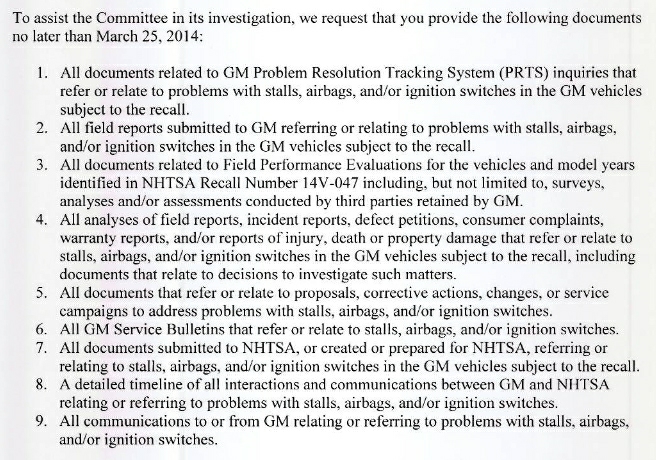Communications About GM's Ignition Trouble
/GM is in a tough spot, apparently having caused 31 accidents and 13 deaths and saying little about them.
The Justice Department and Congress are investigating what sounds like a history of ignition problems that weren't fixed. The New York Times published a timeline, "The Deadly History of a Faulty Ignition Switch," showing accidents dating back to 2003.
In addition to the criminal investigation led by the U.S. Attorney's Office, the House Committee on Energy and Commerce announced its investigation plans:
- Letter to GM CEO Mary Barra
- Letter to the National Highway Traffic and Safety Administration (NHTSA)
Both letters mention a bunch of documentation to be submitted by March 25:
Meanwhile, Barra is keeping GM employees updated. On March 4, she posted this message on GM's intranet:
Dear GM Employee:
As employees of General Motors, many of us have been asked about our recently announced recall. I would like to make sure you know where we stand and what we are doing about it.
First and foremost, everything we are doing is guided by one unwavering principle: do what is best for our customer. Customer safety and satisfaction are at the heart of every decision we make.
Our process for determining whether and when to recall a vehicle is decided by experienced technical experts. They do their work independent of managers with responsibilities for other aspects of the business, so that their decisions are made solely on technical facts and engineering analysis.
When this was brought to my team a few weeks ago, we acted without hesitation to go well beyond the decision by the technical experts. Specifically, we:
- Created a working group of senior executives, which I lead, to direct our response, monitor our progress and make adjustments as necessary.
- Empowered our dealers with resources to provide affected customers with the peace of mind they deserve.
- Coordinated with our supplier to ramp up development and validation of replacement parts to get them into the field as fast as possible.
- Provided federal regulators with comprehensive information on this issue.
- Launched an internal review to give us an unvarnished report on what happened.
We will hold ourselves accountable and improve our processes so our customers do not experience this again.
We sincerely apologized to our customers and others who have a stake in GM's success.
Of course, recalls of this size and scope always take time to play out. Various other parties will naturally be involved, and GM will cooperate fully. You can expect additional developments in the near term.
That has led some to ask if the recall of these out-of-production vehicles might affect our company's reputation or sales of our current models.
My answer is simple: that's not the issue. The vehicles we make today are the best in memory and I'm confident that they will do fine, on their own merits. And our company's reputation won't be determined by the recall itself, but by how we address the problem going forward.
What is important is taking great care of our customers and showing that it really is a new day at GM.
While I deeply regret the circumstances that brought us to this point, I appreciate how today's GM has responded so far. We have much more work ahead of us and I'm confident we will do the right thing for our customers.
Mary
When GM publishes documents to answer the committee's request, particularly for points 8 and 9, customer and internal communications also will be interesting to read.
Discussion Starters:
- How can GM gather all of the required information? Which groups within GM do you think are involved in pulling this together?
- Analyze the House Committee's letters. What differences and similarities do you notice? How are they organized? What's interesting (or not) about the tone and word choice?
- Analyze Barra's communication to employees. How might you react if you were an employee? What works well about the message, and what could you improve?



